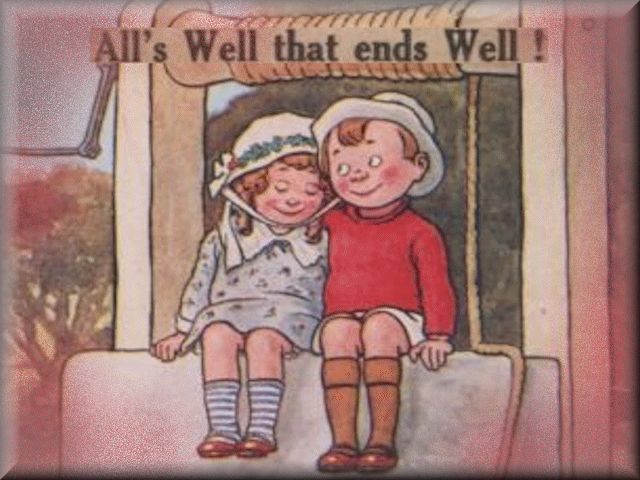“all’s well that ends well”

A favorable outcome to a potentially risky enterprise.
 …. But all’s well that ends well and Tracy is now more popular on account of its railroad srike than was Brainard in its blueberry war scare. – Currie (Minnesota) Pioneer, 1879.
…. But all’s well that ends well and Tracy is now more popular on account of its railroad srike than was Brainard in its blueberry war scare. – Currie (Minnesota) Pioneer, 1879.
 Although appearing in a book of proverbs published in 1546, the saying is best known as the title of William Shakespeare’s All’s Well That Ends Well, published in 1601. The expression also appears in the text. It means that any risky enterprise is worth being pursued as long as the outcome is favorable. In the Little House books, the expression is typically spoken after an event has taken place that might have turned out badly, but didn’t. It was not used in Wilder’s Pioneer Girl manuscript.
Although appearing in a book of proverbs published in 1546, the saying is best known as the title of William Shakespeare’s All’s Well That Ends Well, published in 1601. The expression also appears in the text. It means that any risky enterprise is worth being pursued as long as the outcome is favorable. In the Little House books, the expression is typically spoken after an event has taken place that might have turned out badly, but didn’t. It was not used in Wilder’s Pioneer Girl manuscript.
In Little House on the Prairie –
 After the wagon crosses the Verdigris River safely, even though the water was quite high.
After the wagon crosses the Verdigris River safely, even though the water was quite high.
 After Pa makes it home after being surrounded by a pack of wolves.
After Pa makes it home after being surrounded by a pack of wolves.
 After Mr. Scott is overcome from gas in the well, but it retrieved by Pa (with Ma’s help).
After Mr. Scott is overcome from gas in the well, but it retrieved by Pa (with Ma’s help).
 After the prairie fire comes roaring, but setting a backfire saves the cabin.
After the prairie fire comes roaring, but setting a backfire saves the cabin.
In On the Banks of Plum Creek –
 After the oxen run away with the wagon carrying Pa, Ma, and Baby Carrie, but Pa is able to steer the team away from the high creek bank.
After the oxen run away with the wagon carrying Pa, Ma, and Baby Carrie, but Pa is able to steer the team away from the high creek bank.
In By the Shores of Silver Lake –
 After a man wants to file on the same land Charles Ingalls has picked out, but Mr. Edwards starts a fight so Pa can get into the land office before him.
After a man wants to file on the same land Charles Ingalls has picked out, but Mr. Edwards starts a fight so Pa can get into the land office before him.
 After Grace is feared lost on the prairie, but is found in the buffalo wallow.
After Grace is feared lost on the prairie, but is found in the buffalo wallow.
In The Long Winter –
 After Carrie and Laura are lost in Big Slough, but they stumble upon the Wilder boys, and Almanzo points them in the direction of their pa.
After Carrie and Laura are lost in Big Slough, but they stumble upon the Wilder boys, and Almanzo points them in the direction of their pa.
 After the schoolchildren must walk home from school in a blizzard, but Laura bumps against the last building in town, thus allowing everyone to get their bearings and use landmarks to get the rest of the way home.
After the schoolchildren must walk home from school in a blizzard, but Laura bumps against the last building in town, thus allowing everyone to get their bearings and use landmarks to get the rest of the way home.
In These Happy Golden Years –
 After Laura and Almanzo leave the Brewster settlement in 40-below-zero weather, but manage to make it to the Ingallses without freezing to death.
After Laura and Almanzo leave the Brewster settlement in 40-below-zero weather, but manage to make it to the Ingallses without freezing to death.

“All’s well that ends well” (LHP 2, 7, 12, 22; BPC 11; SSL 25, 30; TLW 2, 9; THGY 8)

